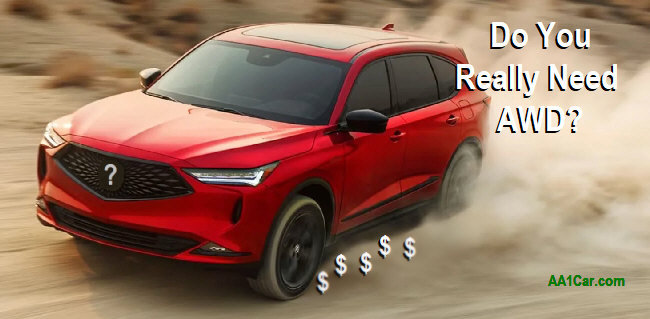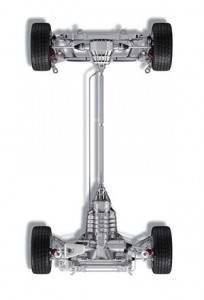
Home, Auto Repair Library, Auto Parts, Accessories, Tools, Manuals & Books, Car BLOG, Links, Index
Do You Really Need All-heel Drive?
by Larry Carley copyright 2024 AA1Car.com


It's hard to find a late model SUV or pickup truck that does not offer All-Wheel-Drive (AWD) or Four-Wheel-Drive (4WD) as an option or standard equipment. In fact, if you are looking for a fullsize, midsize or compact SUV without AWD, good luck because most new car dealer inventories are bloated with AWD SUVs.
AWD/4WD is an upsell and is more profitable than a base model with front or rear drive only. AWD or 4WD typically adds $2500 to $4500 or more to a vehicle's sticker price. You are paying for extra drivetrain components you may never need or use.
AWD or 4WD makes sense if you have a pickup truck or sport utility vehicle that actually needs extra traction for off-road driving or for driving on unpaved roads or roads that may be covered with snow during winter months. Farmers, ranchers, construction workers, delivery drivers, adventurers, campers, explorers or anybody who lives or works where there may be poor road conditions, heavy snow or a need to drive across open fields or on unpaved trails are the ones who really need AWD or 4WD. The rest of us generally don't.
Most city dwellers and suburbanites who buy SUVs with AWD will likely NEVER take it off-road, especially those who buy high end luxury SUVs for driving to the grocery store, Walmart or for hauling their kids to soccer matches.
AWD and 4WD does offer certain advantages, such as improved traction on mud, snow, sand and unpaved roads or open terrain. But it does not improve traction much on ice, and it changes the handling characteristics of a vehicle compared to front-wheel-drive (which pulls) or rear-wheel drive (which pushes). When the drivetrain does both (pushes and pulls at the same time), it changes the handling and steering dynamics, especially at higher speeds and when cornering. A driver who is not familiar with AWD or 4WD may get overconfident and end up putting their vehicle in a ditch if they take a corner too fast.
Besides adding cost, AWD and 4WD add complexity to the drivetrain. And more parts means more things like an additional differential for the other axle, CV joints or U-joints and axle shafts, grease seals, bearings and gears that may require additional maintenance and will eventually wear out and have to be replaced at some point in the future. On a FWD car or SUV, AWD adds two additional halfshafts, a rear differential, a transfer case or center differential for splitting drive torque front-to-rear, and electronic controls to manage the fore and aft (and side-to-side) distribution of power from the engine (called "torque vectoring").

AWD and 4WD also add weight, up to 100 to 200 lbs. or more depending on the application. The added weight and drivetrain friction are not good for fuel economy, and typically reduce for fuel mileage by 1 to 2 mpg.
On most passenger cars and SUVs with AWD, it is fulltime and is computer controlled depending on driving conditions and traction. On pickup trucks, Jeeps and similar vehicles with 4WD, it is not fulltime and is driver-selected as needed (as when taking the vehicle off-road).
On high performance vehicles with AWD, routing power to all four wheels does have a big advantage when it comes to acceleration. By spreading engine torque across all four wheels instead of two (or just one in the case of a car that does not have some type of locking differential or traction control), it pretty much eliminates wheel spin for faster acceleration. That's great for drag racing but really isn't needed for everyday driving.
AWD in a performance car is also great for pulling out of corners. But you can't drift around corners with AWD or do burnouts like you can with a rear-wheel drive car (unless we're talking LOTS of horsepower in a light AWD race car).
Don't get me wrong. I'm not against AWD or 4WD because of its added cost and complexity. What I'm saying is most people who buy SUVs with AWD don't really need it because most of those vehicles will NEVER be driven off-road. AWD can be handy if you have to commute on snow days. But even in the Midwest and Northern states, the roads are usually plowed rather quickly and cleared of snow. So paying a premium for AWD or 4WD if you don�t really need it is just wasting your money.
Spoiler Alert: I have never owned an AWD car or SUV, or a 4WD truck because I've never had a need for such. I live in a large metro area and always drive on paved roads. There is no open public land anywhere near where I live, so there is no place to go off-roading unless I drive hundreds or thousands of miles.
If I lived in Colorado, Arizona, New Mexico, backwoods Arkansas, Big Sky country like Montana or someplace else where I could actually use and enjoy AWD or 4WD, I would buy a vehicle with real off-road capabilities like a Jeep (probably a Wrangler Rubicon), a Ford Bronco Sport or Raptor, or a bigass pickup truck with lots of ground clearance and oversized off-road tires. I've rented Jeeps for off-roading in Colorado and had a blast. But for everyday transportation in the city, suburbia and on paved highways, I don't need AWD or 4WD.
If you've ever driven or ridden in an AWD SUV or 4WD pickup truck with big chunky off-road tires on a long road trip, the rough ride and noise will make you question your choice of transportation. The whining, grinding drone that resonates from those kind of tires gets really tiresome really fast. Worse yet, if the vehicle has extra ground clearance and a stiff suspension, it can feel like you are riding a pogo stick, especially in short wheelbase SUVs. The pitching and bouncing over expansion seams in the pavement can bring on motion sickness in some people.
Handling and stability can also be a concern at highway speeds if a SUV or truck has a higher center of gravity because of a raised suspension. A sudden S-maneuver at speed can end up as a rollover! On icy roads, these vehicles are often the first ones that end up in a ditch or bouncing over a guard rail.
AWD and 4WD are great upgrades for people who actually need it, who will likely use it, and know how to handle it. But for most people, it is an unnecessary expense that just drives up the cost of the vehicle. My advice to those who may be shopping for a new or used vehicle, therefore, is to AVOID buying a car, SUV or truck with AWD/4WD unless you really, really need it. Choose one with front-wheel drive or rear-wheel drive and save the money and gas.
 More Driveline Articles:
More Driveline Articles: Click Here to See More Carley Automotive Technical Articles
Click Here to See More Carley Automotive Technical Articles